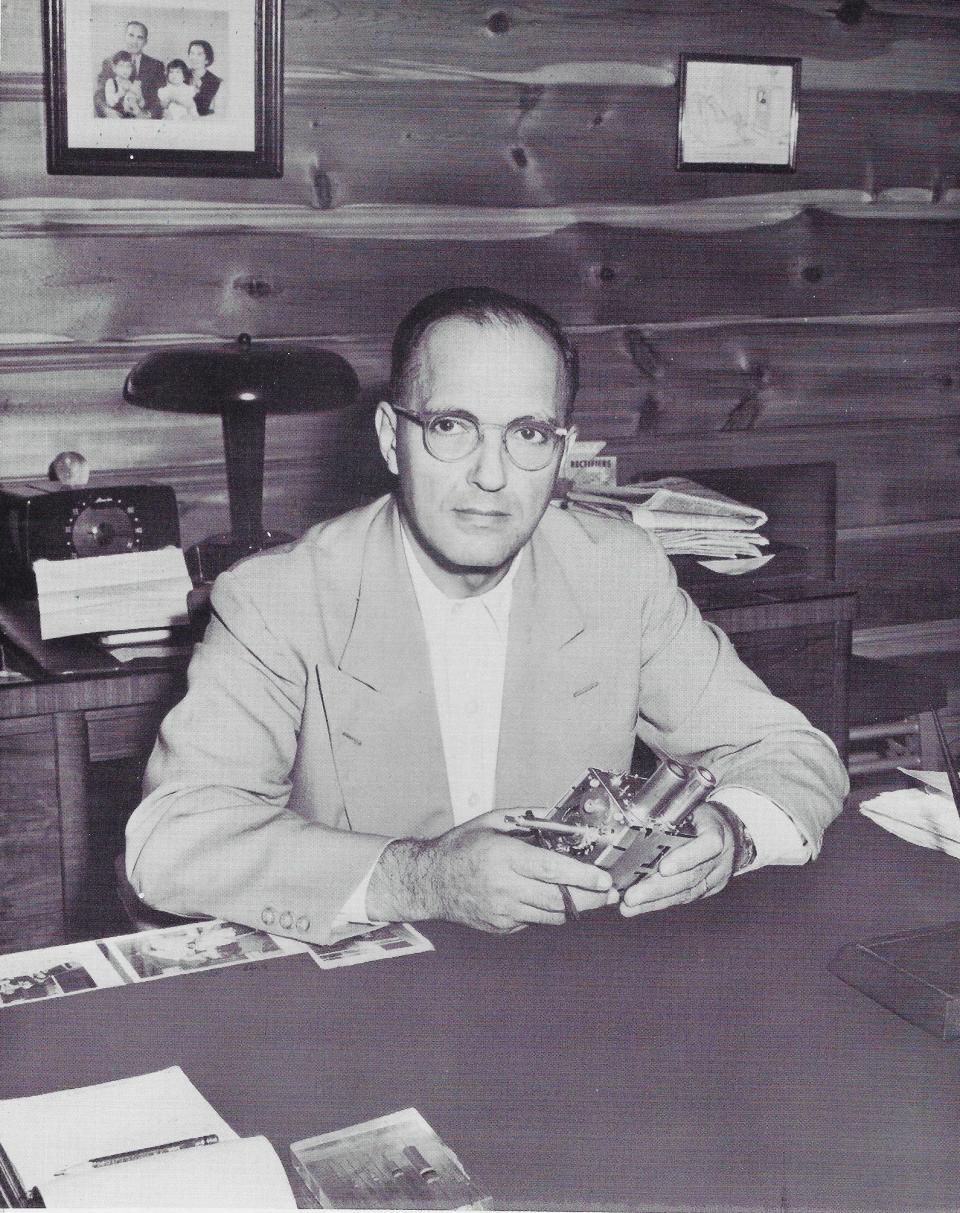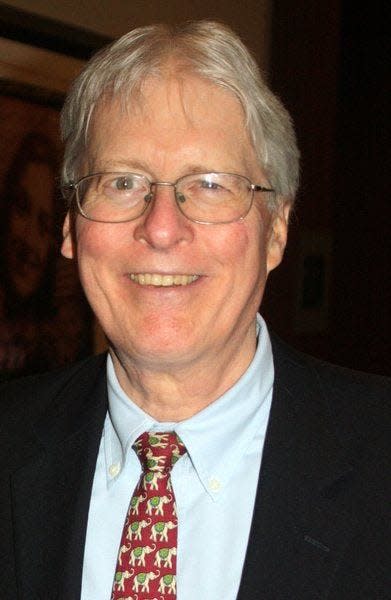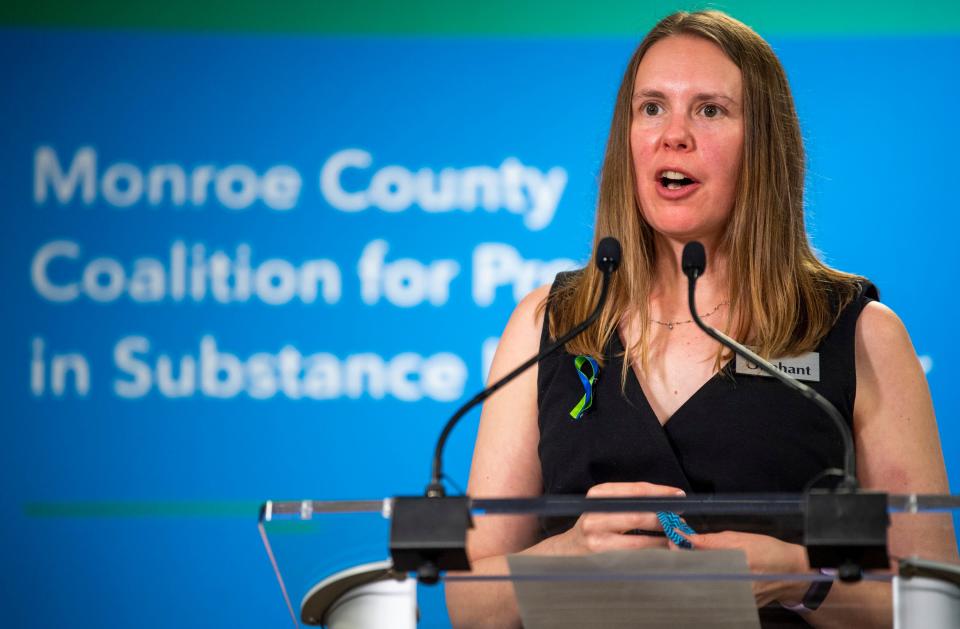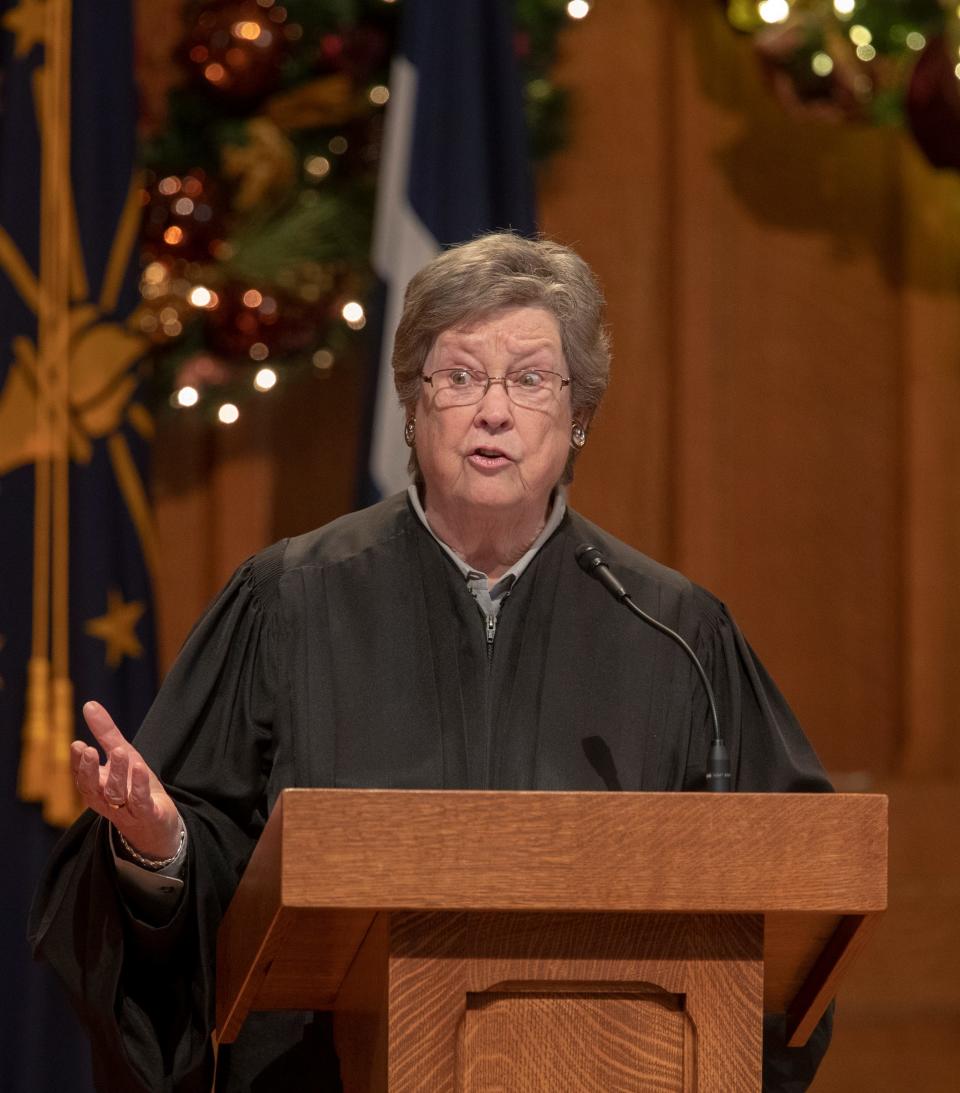Why Monroe County prosecutor, radio station are involved in lawsuit about money, abortion
- Oops!Something went wrong.Please try again later.
Monroe County Prosecutor Erika Oliphant and Bloomington media business Sarkes Tarzian are on opposite sides of a federal lawsuit involving free speech, campaign contributions and abortion.
They are unlikely opponents, given that no wrongdoing is alleged. Oliphant, a Democrat in her second term as prosecutor, is among several defendants in the civil lawsuit filed by the Bloomington enterprise founded in 1944.
A federal judge dismissed the case, saying the concerns raised don't make sense, and that deciding what-if scenarios has no place in the courts. But an appeal has sent it on to the Indiana Supreme Court, where a key component will be argued in September.
Sarkes Tarzian was an Armenian immigrant who moved from Pennsylvania to Bloomington to work at RCA. He started a 200-watt AM radio station in 1946 that initially broadcast high school sports and band concerts. It grew into a local media power and owned a television station.

Seventy-five years later, a legal battle involving his legacy is before the state's highest court.
Whom is Sarkes Tarzian suing?
Sarkes Tarzian Inc., which owns local radio stations WTTS and WGCL, and the Indiana Right to Life Victory Fund, a political action committee for Indiana Right to Life, filed the suit. Indiana Right to Life is “dedicated to protecting the God-given right to life,” its website says.
The lawsuit targets Indiana's attorney general, the secretary of state, five members of the state election division, Marion County Prosecutor Ryan Mears and Oliphant.
Why did Sarkes Tarzian, Right to Life Victory Fund sue?
Sarkes Tarzian wanted to give $10,000 to the Indiana Right to Life Victory Fund to spend on political campaigns and initiatives. But the company and nonprofit worried the size of the donation or its intended use might violate Indiana campaign finance laws.
So, in 2021, Sarkes Tarzian and the right to life group filed suit against the election officials and prosecutors who could take legal action to prevent them from targeting the donations. There also was concern about possible sanctions against the parties for making such contributions, or how the money was spent.
Who represents Sarkes Tarzian, Indiana Right to Life Victory Fund?
Terre Haute attorney James Bopp Jr. is representing Sarkes Tarzian and Indiana Right to Life.

A staunch conservative with an undergraduate degree from Indiana University, Bopp has had high-profile clients such as former U.S. President Donald Trump in a failed challenge to the 2020 election outcome and IU students who sued the university for requiring COVID-19 vaccinations.
Last week, Bopp said the state's Right to Life Victory Fund has corporations interested in donating tens of thousands of dollars, but the nonprofit has refused the cash for fear of being prosecuted for violating campaign finance laws that limit donation amounts.
Bopp said the question of whether contribution limits diminish the ability of people or corporations to participate in a democracy is an important one. He claims Indiana’s election statute violates the U.S. Constitution and cited Citizens United, a 2009 U.S. Supreme Court case.
Citizens United v. Federal Election Commission
In a 5-4 decision in Citizen United v. Federal Election Commission, the court ruled government restrictions on campaign spending “must be directed toward a narrowly construed anticorruption interest that is defined solely in terms of quid pro quo exchanges,” according to an analysis from two law professors, including Nicholas Almendares at IU’s Maurer School of Law.
In other words, federal case law says campaign donation caps should be focused on instances where the donor is expecting or has been promised something in return.
Bopp said when an organization spends money to advocate for a candidate without the candidate’s knowledge — called an “independent expenditure” — there's no hint of corruption and the activity can't be prohibited.
What do Oliphant and other defendants say?
Oliphant said via email she has had little personal involvement in the case. She said when a county prosecutor is sued in their professional role, the attorney general’s office represents them.

“I have not been called to testify or otherwise been involved with the litigation," she said.
Indiana Attorney General Todd Rokita's response to the lawsuit said he believes contributions from corporations to political action committees are unconstitutional when they are earmarked for independent expenditures.
The defendants asked the judge to dismiss the case, in part because Sarkes Tarzian and the nonprofit have not suffered any injury — no contributions have been made and no sanctions sought.
Some of the parties named have signed affidavits confirming they have no interest in suing anyone for such campaign contributions or planned spending.
Bopp said he and his clients want clarification, proof that their donations would be legal.
What did the southern district court rule?
Sarah Evans Barker, judge of the U.S. District Court for the Southern District of Indiana, wrote that Sarkes Tarzian and the nonprofit are unlikely to be sued for their intended contribution and spending.
The attorney general and others, Barker wrote, have said the plaintiffs "can engage in their desired conduct without penalty … we think it highly unlikely that defendants go back on their word and in the process also intentionally violate federal law.”

Bopp doesn't put much faith in what the prosecutors and state officials say since their successors could take a different view of the law.
But, “the court is not required to address and resolve every ‘what if’ imagined or raised,’” Barker said.
The key disagreement
The parties agree Indiana election law does not mention contributions for independent expenditures and disagree over what that means.
Sarkes Tarzian and the nonprofit maintain that since the statute doesn't address independent expenditures, they are effectively prohibited and subject to civil or criminal penalties if the donations are made.
But the parties being sued argue that Indiana election laws’ silence on the matter “signals that these contributions are not regulated," and therefore allowed.
Barker wrote the fears expressed by Sarkes Tarzian and the Indiana Right to Life Victory fund are baseless.
“Plaintiffs here cannot and have not established that the contested Indiana statutes have been, currently are, or ever will be enforced against corporate contributions ... Sarkes has never been fined or prosecuted — or threatened with such action.
“Defendants correctly acknowledge that the Supreme Court's decision in Citizens United forbids governmental limitations on corporate contributions" for independent expenditures, the judge wrote. “This holding renders plaintiffs' allegation that their speech has been ‘chilled’ by these otherwise silent statutes objectively unreasonable.”
Barker dismissed the case. Sarkes Tarzian and the Indiana Right to Life Victory Fund appealed.
How did the U.S. Court of Appeals respond?
Judge Michael Scudder, one of the three judges who heard the appeal, concluded both sides have sound arguments not yet interpreted by the courts.
“In these circumstances, the most prudent course is to invite the opinion of the only body that can definitively construe the Indiana Election Code — the Indiana Supreme Court,” he wrote.
The court said in May it will weigh in on the issue. Oral arguments before the court are scheduled for 9 a.m. Sept. 7.
Almendares, the IU law professor, said Sarkes Tarzian and the Indiana Right to Life Victory Fund should be pleased with the way the case has progressed.
And Luis Fuentes-Rohwer, professor of law at IU’s Maurer School of Law, said under one interpretation of state election law, the plan by Sarkes Tarzian and the nonprofit is illegal. That also would mean state election law clashes with the U.S. Constitution.
But, he said, another interpretation of state law, and the one the Supreme Court is more likely to use, would allow Sarkes Tarzian and the nonprofit to proceed with the contributions without fear.
The resolution rests with the state supreme court, which will decide if the money can be directed where the donors want it to go. Legally.
Boris Ladwig can be reached at bladwig@heraldt.com.
This article originally appeared on The Herald-Times: Sarkes Tarzian takes Right to Life donation case to state Supreme Court

